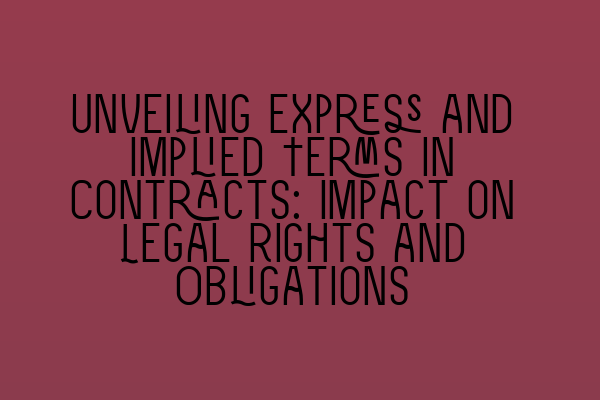Unveiling Express and Implied Terms in Contracts: Impact on Legal Rights and Obligations
Welcome to SQE Contract Law, your go-to source for all things related to contract law. In this blog post, we will delve into the intriguing world of express and implied terms in contracts and examine how these terms can significantly impact your legal rights and obligations. Whether you are a solicitor, law student, or simply interested in understanding the intricacies of contract law, this article is sure to provide you with valuable insights.
Understanding Express Terms
Express terms are the specific provisions that the parties to a contract agree upon and include in their written or verbal agreement. These terms are explicitly stated and leave no room for ambiguity or interpretation. They set out the rights and obligations of the parties and provide clarity on the scope and subject matter of the contract.
Express terms can be found in various forms, such as:
- Written contracts
- Oral agreements
- Offer letters
- Quotations
- Website terms and conditions
When drafting or reviewing a contract, it is essential to pay close attention to express terms to ensure there are no hidden surprises or misunderstandings. Express terms not only define the parties’ rights and obligations but also serve as the basis for resolving disputes and enforcing contractual remedies.
To gain a better understanding of express terms, it is essential to consider relevant case law and legal precedents. In SQE 1 Practice Exam Questions, you can find a comprehensive collection of multiple-choice questions that will test your knowledge and help you familiarize yourself with the practical application of express terms in contract law.
Exploring Implied Terms
While express terms play a central role in contract law, it is equally important to understand the concept of implied terms. Implied terms are not explicitly stated in the contract but are nevertheless considered to be part of the agreement. These terms are inferred by law or by the parties’ conduct and are necessary to give effect to the parties’ intentions.
Implied terms can arise in several ways:
- Common law: Certain terms are implied into contracts as a matter of standard practice and general principles.
- Statute: Legislation may impose certain terms into specific types of contracts to protect the rights of the parties involved.
- Custom and trade usage: In certain industries or professions, there may be established customs or trade usages that are implied into contracts.
- Previous dealings: If the parties have a history of previous dealings, certain terms may be implied based on their prior conduct and course of performance.
The presence of implied terms can significantly impact the rights and obligations of the parties. Failure to consider or understand these implied terms can lead to unintended consequences or disputes. Therefore, it is crucial to consult legal experts or access relevant resources, such as SQE 1 Practice Mocks FLK1 FLK2, which offer simulated exam experiences to help you assess your understanding of implied terms and their effect on contractual agreements.
The Importance of Legal Rights and Obligations
Express and implied terms in contracts directly impact the legal rights and obligations of the parties involved. They define the parameters within which the parties must operate, establish performance expectations, and allocate risk and liability. Understanding these rights and obligations is essential for individuals and businesses to ensure compliance and protect their interests.
Legal rights refer to the entitlements that parties have under the contract. These rights can include anything from payment obligations, delivery obligations, termination rights, intellectual property rights, and more. Failure to recognize and enforce these rights can result in financial loss, reputational damage, or even legal action.
On the other hand, legal obligations are the duties and responsibilities that parties must fulfill under the contract. These obligations can range from providing goods or services, maintaining confidentiality, complying with regulatory requirements, and more. Breaching these obligations can lead to legal consequences, such as lawsuits, damages, or contract termination.
To ensure a comprehensive understanding of legal rights and obligations, it is highly recommended to undertake professional courses, such as SQE 2 Preparation Courses and SQE 1 Preparation Courses, designed to equip you with the necessary knowledge and skills to navigate the complex landscape of contract law.
The Role of Solicitors
Solicitors play a crucial role in the formation, review, and enforcement of contracts. With their expertise in contract law, solicitors ensure that the rights and obligations of their clients are adequately protected and that the terms of the contract align with their clients’ interests.
When it comes to express and implied terms, solicitors provide valuable insights and guidance to ensure clarity, fairness, and enforceability. They help their clients identify potential risks, negotiate terms, and draft contracts that reflect the parties’ intentions accurately.
Moreover, solicitors are instrumental in resolving disputes arising from express and implied terms. They analyze the contractual provisions, examine applicable laws, and advocate for their clients’ rights in negotiations, mediation, or court proceedings.
If you require professional assistance in contract law matters, SQE Contract Law can connect you with experienced solicitors who can provide tailored solutions to meet your specific needs. Contact us today to access a network of legal professionals who are well-versed in handling contractual issues.
Conclusion
Express and implied terms are pivotal components of contracts that define the rights and obligations of the parties involved. Understanding and applying these terms correctly is essential to protect your interests and ensure compliance with your contractual obligations.
As you navigate the ever-evolving world of contract law, continue to expand your knowledge through resources such as SRA SQE Exam Dates. Stay informed about the latest developments, cases, and legal precedents to enhance your understanding and expertise in this area.
Remember, staying proactive and well-informed will contribute to your success as a solicitor, law student, or business professional. SQE Contract Law is here to support you on your journey to contractual excellence.
